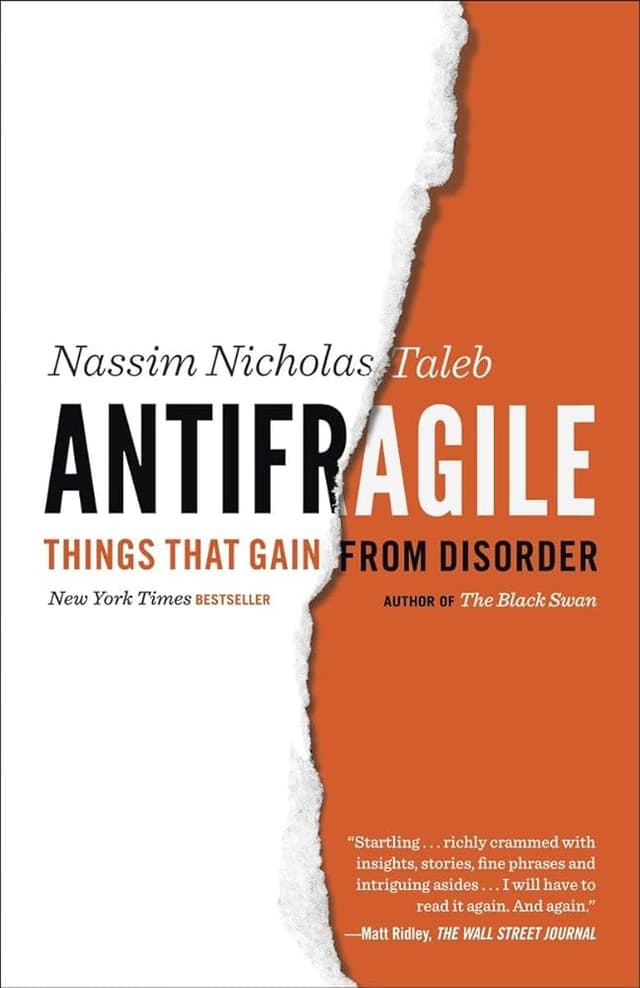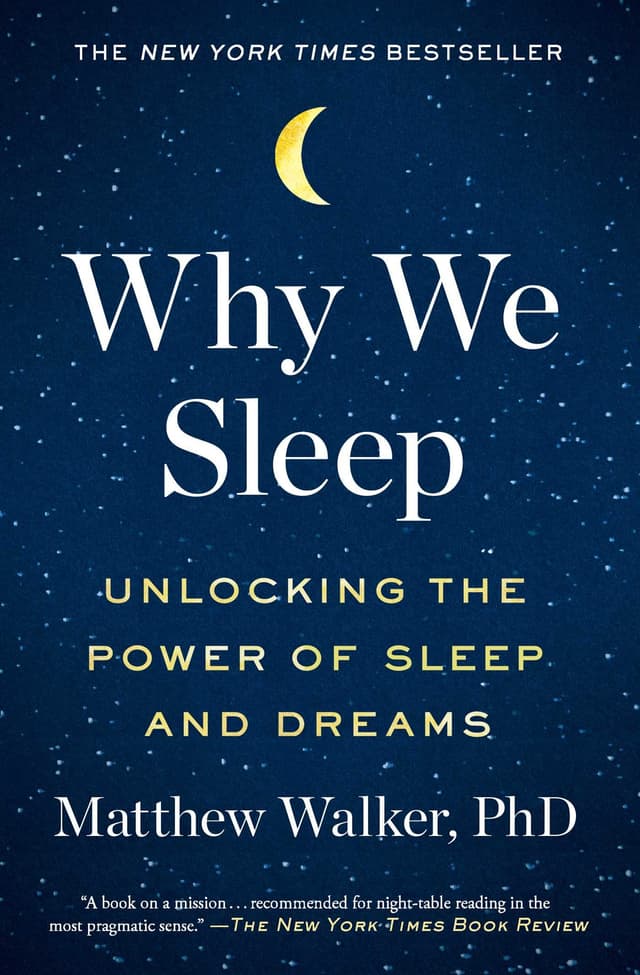Antifragile: Things That Gain from Disorder vs. Why We Sleep
Antifragile: Things That Gain from Disorder
"Antifragile: Things That Gain from Disorder" by Nassim Nicholas Taleb is a groundbreaking exploration of systems and entities that thrive and grow stronger in the face of stress, volatility, and chaos. Taleb introduces the concept of "antifragility," which goes beyond resilience or robustness. Through a mix of philosophy, practical wisdom, and real-world examples, Taleb illustrates how embracing uncertainty and leveraging disorder can lead to success and innovation. This book is essential for anyone interested in risk management, personal development, and understanding how to benefit from uncertainty and change.
Why We Sleep
By Mathew Walker - We sleep 1/3 of our life yet understand so little about it...

Reviews
Reviewed on 2/29/2024
I remember reading Antifragile when it first came out and it made a huge impression. It changed the way I think in plenty of subtle ways. I've been rereading Nassim Nicholas Taleb recently, starting with Black Swan. I really want to reread Antifragile this year too.
Reviews
| Item | Votes | Upvote |
|---|---|---|
| Innovative and original concepts | 1 | |
| Practical applications across various fields | 1 | |
| Engaging and thought-provoking narrative | 1 |
| Item | Votes | Upvote |
|---|---|---|
| Taleb's writing style can be polarizing | 1 |
| Item | Votes | Upvote |
|---|---|---|
| No pros yet, would you like to add one? | ||
| Item | Votes | Upvote |
|---|---|---|
| No cons yet, would you like to add one? | ||
Frequently Asked Questions
'Antifragile' by Nassim Nicholas Taleb offers innovative concepts and practical applications that can significantly enhance personal development, particularly in understanding how to thrive in uncertainty. In contrast, 'Why We Sleep' by Mathew Walker focuses on the importance of sleep for overall health and well-being. While both books provide valuable insights, 'Antifragile' may be more beneficial for those looking to develop resilience and adaptability in their personal and professional lives.
'Antifragile' is known for its engaging and thought-provoking narrative, which captivates readers with its original concepts and real-world examples. On the other hand, 'Why We Sleep' is informative but may not have the same level of narrative engagement as 'Antifragile'. Therefore, readers seeking a more stimulating reading experience might find 'Antifragile' to be the more engaging option.
Yes, 'Antifragile' has been noted for its polarizing writing style, which can be divisive among readers. Some appreciate Taleb's unique approach, while others may find it challenging. In contrast, 'Why We Sleep' generally has a more straightforward and accessible writing style, making it easier for a broader audience to engage with. Thus, if writing style is a concern, 'Why We Sleep' may be the safer choice.
'Antifragile: Things That Gain from Disorder' by Nassim Nicholas Taleb is a groundbreaking exploration of systems and entities that thrive and grow stronger in the face of stress, volatility, and chaos. Taleb introduces the concept of 'antifragility,' which goes beyond resilience or robustness. Through a mix of philosophy, practical wisdom, and real-world examples, Taleb illustrates how embracing uncertainty and leveraging disorder can lead to success and innovation. This book is essential for anyone interested in risk management, personal development, and understanding how to benefit from uncertainty and change.
Pros of 'Antifragile: Things That Gain from Disorder' include its innovative and original concepts, practical applications across various fields, and an engaging and thought-provoking narrative. However, a con noted by some readers is that Taleb's writing style can be polarizing.
Nassim Nicholas Taleb is a renowned scholar, statistician, and former trader known for his work on probability, uncertainty, and risk management. He is the author of several influential books, including 'The Black Swan,' 'Fooled by Randomness,' and 'Antifragile.' Taleb's work often focuses on the limits of knowledge and the impact of rare, unpredictable events.
'Why We Sleep' by Matthew Walker explores the vital importance of sleep, how it affects our health, and the consequences of sleep deprivation. The book delves into the science behind sleep, offering insights into why we need it and how it influences our cognitive functions, physical health, and overall well-being.
Matthew Walker is a professor of neuroscience and psychology at the University of California, Berkeley. He is a renowned sleep expert who has conducted extensive research on the impact of sleep on human health. Walker is the author of the book 'Why We Sleep,' which aims to educate the public on the importance of sleep.
'Why We Sleep' covers a range of topics related to sleep, including the stages of sleep, the impact of sleep on learning and memory, the health consequences of sleep deprivation, and the role of dreams. The book also offers practical advice on how to improve sleep quality and discusses the societal implications of widespread sleep neglect.
According to 'Why We Sleep,' sleep is crucial for maintaining cognitive functions, physical health, and emotional stability. It plays a vital role in memory consolidation, immune system functioning, and metabolic regulation. Lack of sleep can lead to a range of health issues, including increased risk of chronic diseases, impaired cognitive performance, and mood disorders.




















